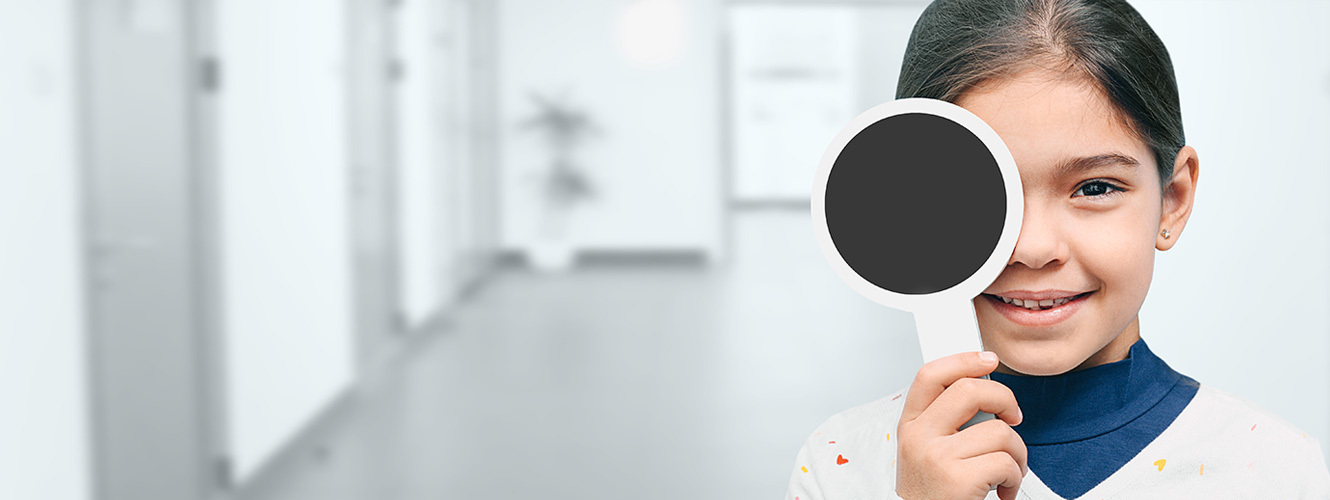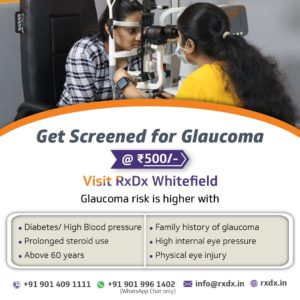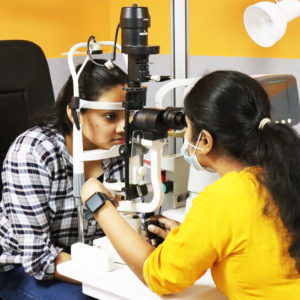Ophthalmology
Ophthalmologists – For Consultation, Eye Testing and More

What is Ophthalmology?
Ophthalmology is the branch of medicine associated with the study, treatment and diagnosis of disorders and diseases of the eye.
Get Screened for Glaucoma
Regular glaucoma screening can help detect the disease early and prevent vision loss.
An affordable and accurate eye pressure test, also known as the IOP test or glaucoma eye test, can help detect the most significant risk factor of Glaucoma, which is Intraocular Pressure or IOP.

Ophthalmology Enquiry Form
TAT Attention!
Response Time to FORMs:
Within 6 hours on best effort basis
NOTE
If your inquiry is urgent, please call +91 901 409 1111.
You may also reach us through WhatsApp Chat between
8 am – 8 pm at +91 90199 61402 or email us on info@rxdx.in

Eye Screening Package
-
OFF 30%

Basic Eye Screening
Original price was: ₹1,850.00.₹1,295.00Current price is: ₹1,295.00. Select options This product has multiple variants. The options may be chosen on the product page
Who are Ophthalmologists?
What do we do different at RxDx?
Consultations for the following conditions
- Cataracts
- Glaucoma
- Misaligned eyes or strabismus (squints)
- Pediatric ophthalmology
- Orthoptic procedures like corrective lenses, strabismic, eye patching
- Common ophthalmic problems

Facilities Available
- Diabetic Retinopathy
- Opticals
- Auto refractometer
- Consultation
- Equipment
- Eye testing
- Minor procedures like sty removal, foreign body removal, minor excision
- Ophthalmoscope
- Slit lamp
- Tonometry
Diabetic Retinopathy
Introduction
Diabetic retinopathy is a common complication of diabetes. It occurs when high blood sugar levels damage the cells at the back of the eye (known as the retina). If it isn’t treated,it can cause blindness. It’s important for people with diabetes to control their blood sugar levels. Everyone with diabetes who is 12 years old or over should have their eyes examined once a year for signs of damage.
All people with diabetes are at risk of getting diabetic retinopathy, but good control of blood sugar levels, cholesterol and blood pressure minimizes this risk. Diabetic retinopathy is caused by changes in the blood vessels of the retina. When these blood vessels are damaged, they may leak blood and grow fragile new vessels. When the nerve cells are damaged, vision is impaired. These changes can result in blurring of your vision, hemorrhage into your eye, or, if untreated, retinal detachment. Diabetic retinopathy is the most common diabetic eye disease and a leading cause of blindness.
At first, diabetic retinopathy may cause no symptoms or only mild vision problems. Eventually, however, diabetic retinopathy can result in blindness. Diabetic retinopathy can develop in anyone who has type 1 diabetes or type 2 diabetes. The longer you have diabetes, and the less controlled your blood sugar is, the more likely you are to develop diabetic retinopathy.
To protect your vision, take prevention seriously. Start by carefully controlling your blood sugar level and scheduling yearly eye exams.
Who can do the test:
- People with the following symptoms
- Blurred vision
- Sudden loss of vision in one eye
- Seeing rings around lights
- Dark spots or flashing lights
Risk factors:
- Poorly-controlled diabetes
- High blood pressure
- Long-term duration of diabetes
- Elevated blood cholesterol levels
- Sleep apnea
Protocols for the test:
Walk-in and do the test ( No fasting) People with contact lenses need to remove the lenses prior to examination.
How diabetes can damage the retina?
The retina is the light-sensitive layer of cells at the back of the eye. It converts light into electrical signals. The signals are sent to the brain through the optic nerve, and the brain interprets them to produce the images that you see.
To work effectively, the retina needs a constant supply of blood, which it receives through a network of tiny blood vessels. Over time, a continuously high blood sugar level can cause the blood vessels to narrow, bleed or leak. These damage the retina and stop it from working. When the blood vessels in the central area of the retina (the macula) are affected, it’s known as diabetic maculopathy.
Symptoms of diabetic retinopathy
During the initial stages, retinopathy does not cause any noticeable symptoms. You may not realize that your retina is damaged until the later stages when your vision becomes affected. Vision loss will probably be permanent at this late stage, which is why diabetic retinopathy is so essential. If you have diabetes and start to notice problems with your vision, contact your GP or diabetes care team immediately.
Screening for diabetic retinopathy
As severe retinopathy can cause sudden blindness, it needs to be identified and treated as soon as possible. Diabetic Retinopathy Screening Programme aims to reduce the risk of vision loss in people with diabetes. This is done by identifying retinopathy at an early stage and ensuring that treatment is given to reduce or prevent sight damage.
Everyone with diabetes who is 12 years old or over is invited for screening once a year. The screening test involves examining the back of the eyes and taking photographs of the retina. Screening can detect diabetic retinopathy before you notice any changes to your vision.
Treating diabetic retinopathy
Treatment for retinopathy will depend on the stage the condition has reached.
For example, if retinopathy is identified in its early stages, you can prevent it from getting worse just by controlling your diabetes.
If you have more advanced retinopathy, you may need to have laser surgery or injection therapy to prevent further damage to your eyes.
Preventing diabetic retinopathy
To reduce your risk of developing retinopathy, it’s important to control your blood sugar level, blood pressure, and cholesterol level. Good control will prevent diabetic complications in almost everyone.
- Attending your annual screening appointment
- Informing your GP if you notice any changes to your vision (do not wait until your next screening appointment)
- Taking your medication as prescribed
- Lose weight (if you’re overweight) and eating a healthy balanced diet
- Exercise regularly
- Giving up Smoking
- Controlling your blood pressure and cholesterol levels
To know more or to book an appointment please call 9014091111
Consultants at RxDx Ophthalmology
Fix an Appointment


